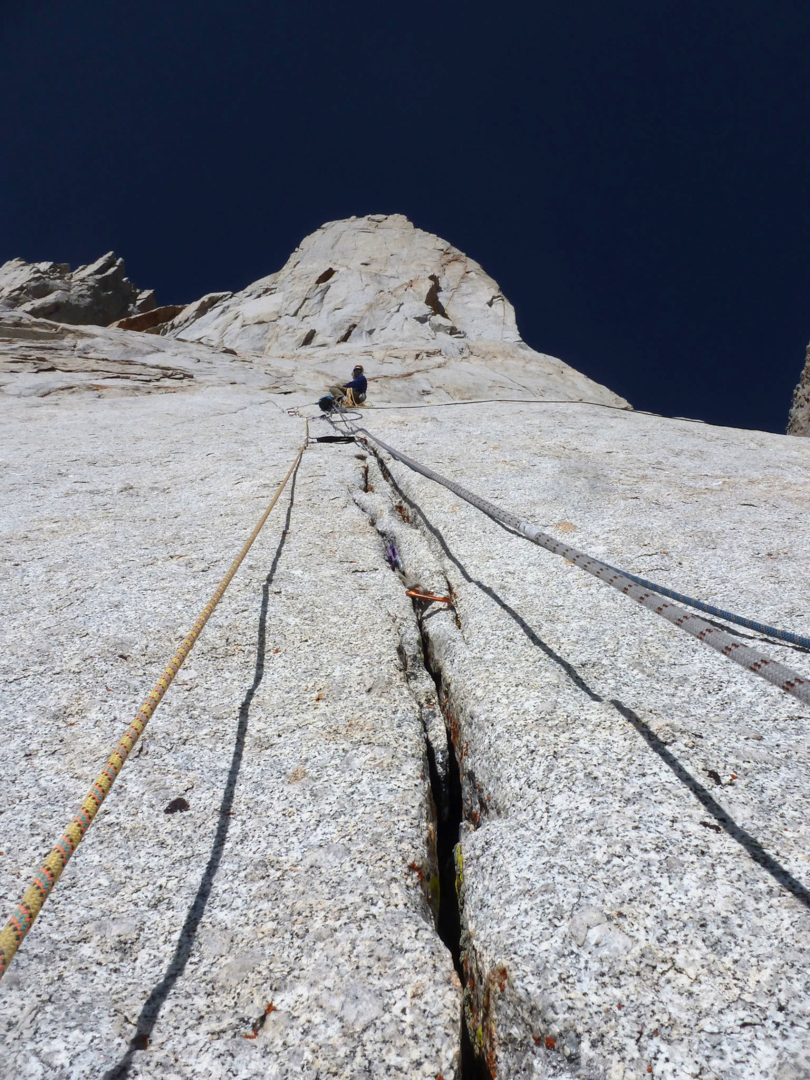Day Needle, BCB On The Prow; Keeler Needle, Blood of the Monkey
California, Sierra Nevada

In summer 2011 and 2012, Amy Ness and I established two new routes on the needles of the Mt. Whitney massif. The first route is on Day Needle: BCB On The Prow (15 pitches, VI 5.10 A1). We initially sieged the first four pitches (500’) of this route over a period of two weeks in summer 2011, reaching a high point over a massive roof, where we found thin seams and blank slab above. We retreated, but soon afterward returned to make the final push from our high point, which totaled four days and three nights. We went as light as possible: a single sleeping bag, no stove, and five gallons of water. We placed a total of 12 bolts (six for protection), and fixed 11 pitons (two for a pendulum to a very small bivy ledge atop pitch four). Pitch six contains a button-head rivet ladder with one piton (A1). The seventh and eleventh pitches are incredibly overhanging and clean. And the tenth pitch contains 70m of the best high-altitude crack climbing I have done thus far.
The route is now equipped for an all-free ascent with some wild crack climbing. Pitch three is not easy: Exciting moves past two button-heads will bring you to a 30’ horizontal traverse between two pitons. This leads to an incredible finger crack to finish this 70m pitch. The giant roof on pitch four will prove to be the crux of the free ascent, as well as the blank slab on pitch six. We encountered no signs of previous ascent until pitch 14, where we found a homemade bong and 1/4” hanger, as well as a homemade nut above a massive chockstone when we intersected the John Vawter route.
Our second route ascends Keeler Needle: Blood of the Monkey (16 pitches, VI 5.12). Beginning in late May 2012, we went capsule-style over 10 days and nine nights for an all-free ascent. At times we had to rappel back down several hundred feet to redpoint certain pitches. We hauled 72 pounds of water, a whole lot of equipment, and were completely self-supported. We feel this is a very proud and climbable line.
The first five pitches of the route jump between Australopithecus (a.k.a. Southern Monkey, VI 5.9 A3) and the Lowe Route (V 5.9 A3). It also briefly links back into Southern Monkey at the end of pitch nine and the start of the tenth-pitch headwall. We fixed two knifeblade pitons on Jeff Lowe and John Wieland’s route at pitch four, which we linked from Southern Monkey, and dubbed the Upside-Down Screamer Traverse. Outside of those two pitons, we fixed nothing else on existing routes. A total of 15 bolts (12 button-heads and three 3/8”) were placed on the new pitches: seven for protection, eight for anchors. Three knifeblade pitons were also left behind.
Some highlights pitches from the route include: the Great White Shield (originally C2 on Southern Monkey, now 5.11), the Upside-Down Screamer Traverse (A2 hooking, now 5.10c), and Lowe’s Splitter (5.10), which has perfect locks and splitter jams for 180’. Pitch seven starts with a cool wide section, leading to an arête on the left and a massive north-facing dihedral on the right. Two button-heads protect this wild arête, followed by an exciting traverse to a piton (5.11). This sets the climber up for the crux eighth pitch: a slightly overhanging, well-protected 100’ crack (5.12). Pitches 10 and 11 were by far the most impressive part of the route. This headwall is very blank and overhung, yet the pitches went at a fairly moderate grade: Pitch 10 climbs through a ledge system, slowly petering out at a hanging belay (5.11); pitch 11 climbs the Red Explosion Dike Traverse, which has incredible moves through red huecos, including underclings, jugs, and side-pulls on the steepest part of the headwall (5.11d).
Myles Moser, AAC








